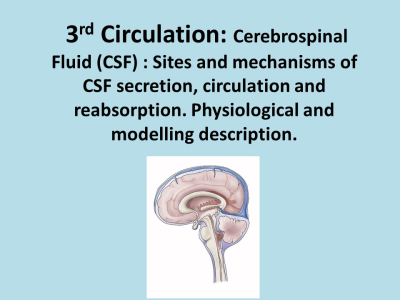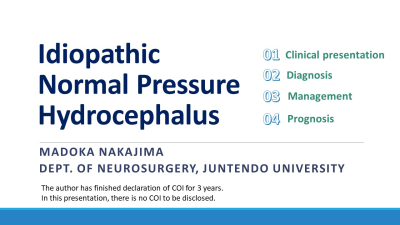Weekday Course
Intracranial Pressure
Joint Annual Meeting ISMRM-ESMRMB & ISMRT 31st Annual Meeting • 07-12 May 2022 • London, UK

| Intracranial Pressure: Physiology | |||
| 16:45 |  |
Physiology of Intracranial Flow & Pressure Video Permission Withheld
Marek Czosnyka
Cerebrospinal Fluid (CSF) flows continuously within all cavities of cerebrospinal space. Flow is slow, approximately 2000 times slower than Cerebral Blood Flow (CBF). Dynamic relationship between CBF and CSF circulation is complex, and involves basic physiological mechanism like cerebrovascular resistance, compartmental compliances, autoregulation of CBF, vascular impedance and critical closing pressure (CrCP). Proper functioning of CSF flow pathway is guaranteed by matching CSF production to absorption rate. This part of CSF steady circulation is easy to describe in a form of Davson's equation. Apart of circulation CSF displays some pulsatiles movments, which may be investigated using PCMRI.
|
|
| 17:15 | Measuring Intracranial Flow & Pressure
Anders Wåhlin
We are now beginning to understand how intracranial pressure gradients, and intracranial pressure transients, propel the cerebrospinal fluid circulation and contributes to cerebrospinal fluid-based brain clearance. This talk reviews approaches to study cerebrospinal fluid flow and pulsatility across different frequency regimes of relevance (bulk flow, respiration, cardiac) and characterize the interplay between intracranial vascular and cerebrospinal fluid compartments. Special attention is devoted to the prospect of non-invasively measuring intracranial pulse pressure and pressure.
|
||
| Intracranial Pressure: Clinical Aspects | |||
| 17:45 |  |
Normal-Pressure Hydrocephalus
Madoka Nakajima
Idiopathic normal pressure hydrocephalus (iNPH) is a condition resulting from impaired cerebrospinal fluid (CSF) absorption and secretion characterized by a triad of symptoms comprising dementia, gait disturbance (impaired trunk balance), and urinary incontinence. The symptoms of iNPH can be reversed by improving CSF turnover through shunting. However, early diagnosis is essential as once neurodegeneration has progressed, pathological changes become irreversible and symptom improvement is minimal, even after shunting. Combining a variety of diagnostic methods may lead to a more definitive diagnosis and accurate prediction of the prognosis following shunt treatment.
|
|
| 18:15 | Advances in Imaging Spontaneous Intracranial Hypotension Video Unavailable |
||
The International Society for Magnetic Resonance in Medicine is accredited by the Accreditation Council for Continuing Medical Education to provide continuing medical education for physicians.